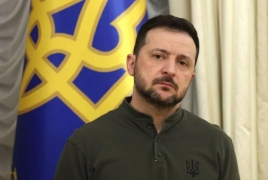
A senior Ukrainian government official has stated that Ukraine has not been invited to the upcoming discussions between the United States and Russia aimed at ending the war, as reported by the BBC.
Despite U.S. Special Envoy Keith Kellogg's announcement that Kyiv would participate in the February 17 talks in Saudi Arabia, the source indicated that no Ukrainian delegation will be present.
European leaders have also been excluded from these discussions. Instead, they are set to meet in Paris on Monday for a hastily arranged summit by President Emmanuel Macron, amid concerns that Europe is being sidelined in the war resolution negotiations.
These separate meetings follow a significant shift in Washington's stance on the Ukraine war. White House Middle East Envoy Steve Witkoff has confirmed his attendance in Saudi Arabia for the first direct U.S.-Russia peace talks.
On February 16, U.S. President Donald Trump announced that Witkoff had already engaged in a "very long, about three-hour" conversation with Vladimir Putin.
Witkoff, a billionaire real estate investor and close associate of Trump, was in Moscow to negotiate the release of an American teacher imprisoned on marijuana possession charges.
U.S. Secretary of State Marco Rubio and National Security Advisor Mike Waltz are also scheduled to meet with the Russian delegation in Saudi Arabia, just a week after Trump's conversation with Putin.
Ukrainian President Volodymyr Zelensky has consistently rejected any peace agreement that excludes Ukraine's direct involvement.
In an interview with NBC, he emphasized, "I will never accept any decision between the U.S. and Russia regarding Ukraine, never."
Witkoff highlighted that U.S. officials are conducting separate discussions with the Ukrainian side but did not specify whether Kyiv would be present in Saudi Arabia.
Meanwhile, Macron plans to hold an informal meeting on February 17 to discuss Ukraine and European security issues.
Ahead of the anticipated summit, UK Prime Minister Keir Starmer stated that the country is prepared to provide security guarantees to Ukraine, including deploying British troops if necessary.
In an article published in the Daily Telegraph, he stressed that ensuring lasting peace in Ukraine is "essential if we want to prevent further aggression from Putin in the future."
Conversely, U.S. Envoy for Ukraine Keith Kellogg dismissed concerns about Europe's exclusion from the Saudi Arabia talks, arguing that previous negotiations failed due to the involvement of too many participants.
"It may be frustrating, it may be concerning, but I'm telling you something that's really very honest," he said.
These developments signify an acceleration of President Donald Trump's efforts to swiftly end the war.
Following his phone call with President Vladimir Putin, Trump stated that negotiations to halt the "senseless war" in Ukraine would commence immediately.
He also declared that NATO membership for Ukraine is "not practical" and that it's unlikely Kyiv will regain its pre-2014 borders.
Trump's stance has raised concerns in Europe, especially after his defense secretary echoed similar sentiments, deepening suspicions that the U.S. might make concessions to Russia without Ukraine's involvement.
U.S. Defense Secretary Pete Hegseth emphasized that European countries should bear a "significantly larger" share of funding Ukraine's defense, stating that Washington will no longer "tolerate unbalanced relationships" with its allies.
Vice President J.D. Vance reiterated this message at the Munich Security Conference, urging Europe to "make greater efforts for its own defense." His speech primarily focused on criticizing European democracies.
In response, Ukrainian President Volodymyr Zelensky called for the creation of a European army, arguing that the continent can no longer rely on Washington's support.

